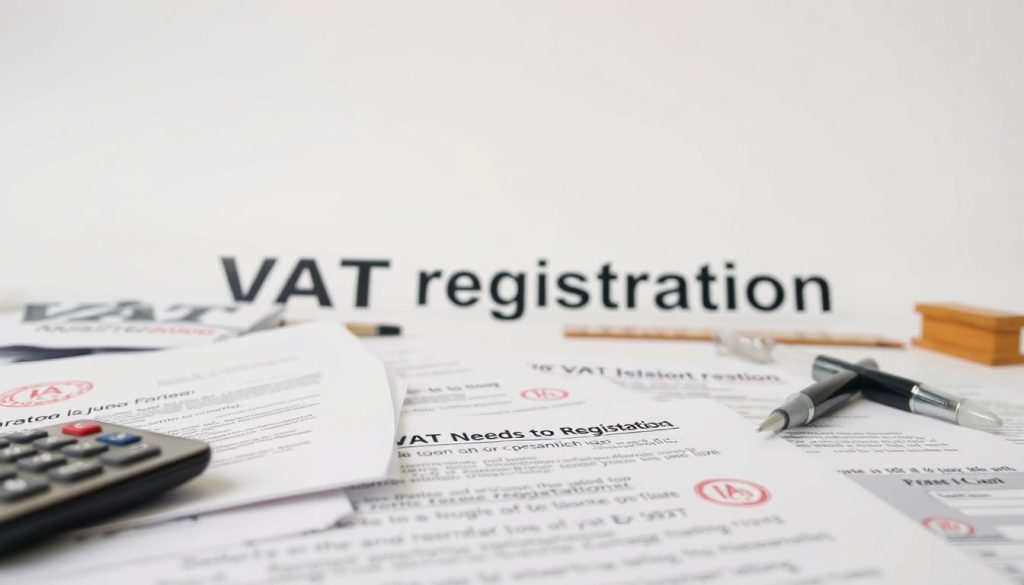Starting a business in Cyprus means you need to know about VAT registration. This guide is here to help UK entrepreneurs understand Value Added Tax (VAT). We aim to make the VAT registration process in Cyprus easy and clear.
Our guide offers valuable insights and a detailed overview of the VAT process. It will walk you through the key steps. This way, you can ensure your business follows the rules and grows in the lively Cypriot market.
What is VAT and Why is it Important?
VAT, or Value Added Tax, is a tax on goods and services. It’s collected by businesses for the government. Knowing about VAT helps businesses follow the law and build trust with customers.
Understanding Value Added Tax
VAT makes sure tax is fair and collected at different stages. This stops tax from adding up too much. Companies face different VAT rates, depending on what they sell.
Benefits of VAT Registration for Businesses
Registering for VAT has many advantages. Businesses can get back VAT on what they buy. This helps with money flow and makes them look more professional. It also builds trust with customers, which is key when competing with others.
Common Myths About VAT
There are many myths about VAT. Some think only big businesses need to register. But, any business that makes a certain amount of money must. Also, VAT is not a tax on profit but on what’s sold. Knowing the truth helps businesses make better choices.
Who Needs to Register for VAT?
It’s key for all businesses in Cyprus to know about VAT registration. We’ll look at who must register, the VAT thresholds, and exemptions. This helps avoid penalties and ensures compliance.
Types of Businesses Required to Register
Many businesses must register for VAT. This includes sole traders, partnerships, and limited companies with high revenues. It’s important to check if your business needs to register based on its activities and earnings.
- Sole traders with revenue over the VAT threshold.
- Partnerships with trading or service income above the threshold.
- Limited companies with taxable activities and significant revenue.
Thresholds for Mandatory Registration
The Cyprus tax authorities set VAT thresholds. Businesses above these must register for VAT, regardless of their structure. Here are the main thresholds:
| Business Type | VAT Threshold (Annual Revenue) |
|---|---|
| Sole Traders | €15,600 |
| Partnerships | €15,600 |
| Limited Companies | €15,600 |
Exemptions and Special Cases
Some businesses might not need to register for VAT. This includes certain educational or healthcare services. It’s important to know about these exemptions to avoid unnecessary registration.
- Educational services by recognised institutions.
- Healthcare services under public sector rules.

The VAT Registration Process in Cyprus
Understanding the VAT registration process in Cyprus is key for businesses. This guide will walk you through the steps, documents needed, and how long it takes. By following these steps, you can navigate the VAT registration smoothly.
Step-by-Step Guide to Registration
The VAT registration process has several important steps. First, businesses must fill out the VAT application form and send it to the Cyprus tax authorities. Then, they need to attach all required documents to the application to avoid delays.
After submitting, the tax office will review the application. They might ask for more information or clarification. Once approved, a VAT registration number is issued, allowing businesses to operate under VAT in Cyprus.
Required Documentation for Registration
When applying for VAT registration, you need specific documents. These include:
- Proof of business identity (such as a certificate of incorporation)
- Bank statements or lease agreements to validate business premises
- Details of company directors and shareholders
- Estimates of expected turnover and business activities
- Tax identification numbers for all individuals involved
Having these documents ready before applying can make the VAT registration process easier.
How Long Does the Process Take?
The time it takes to register for VAT varies. Generally, it can take two to six weeks after submitting the application and documents. If the tax office needs more information, it may take longer.
It’s a good idea to stay in touch with the authorities during this time. This can help speed up the process.
Understanding VAT Rates in Cyprus
When you work in Cyprus, knowing the VAT rates is key. These rates affect our money planning and following the rules. Cyprus has a standard VAT rate and lower rates for some items. New VAT laws have changed some rates and who they apply to, so businesses need to keep up.
Standard and Reduced VAT Rates
The standard VAT rate in Cyprus is 19%. This rate is for most things you buy and services you get. But, some items like food, medicine, and certain places to stay have lower VAT rates of 9% or 5%. These lower rates help make these important items cheaper.
Special VAT Rates for Specific Products
Cyprus also has special VAT rates for certain products. For example, exports and some international services have a zero rate. This is important for businesses that sell across borders. It can change how they price things and deal with customers.
Recent Changes in VAT Legislation
VAT laws in Cyprus have changed a lot recently. These changes are to keep up with the economy and what people need. Companies must keep track of these updates to stay legal and competitive. We suggest watching these changes closely to stay ahead in the market.

How to Manage VAT Compliance
Managing VAT compliance is key for businesses in Cyprus. Keeping accurate records, filing VAT returns on time, and knowing VAT mistakes can help. This section covers important practices for handling VAT obligations well.
Record-Keeping Requirements for VAT
Accurate records are essential for VAT compliance. We need to document all sales and purchases. This helps with VAT return calculations. Important records include:
- Invoice details showing the VAT amount charged.
- Receipts for expenses that include VAT.
- Records of any imports and exports.
- Bank statements reflecting VAT transactions.
Good record-keeping helps with VAT compliance and makes audits easier.
Filing VAT Returns: How and When
Filing VAT returns correctly and on time is critical. Returns are due quarterly or annually, based on our business size and VAT method. To file the VAT return, we need to:
- Compile all necessary documents and records.
- Calculate the total VAT collected and paid within the invoicing period.
- Complete the VAT return form with precise figures.
- Submit the return through the relevant online platform before the deadline.
Meeting these deadlines helps avoid late fees and keeps us compliant.
Common Mistakes to Avoid
Practicing to avoid VAT mistakes is vital for compliance. Common errors include:
- Neglecting to keep proper invoices and receipts.
- Inaccurate calculations of VAT due.
- Missing deadlines for submitting VAT returns.
- Failure to claim input VAT on eligible expenses.
By avoiding these mistakes, we can protect our compliance status and make VAT easier to manage.
VAT Registration for Foreign Companies
Foreign companies doing business in Cyprus might wonder about VAT registration. We’ll explain if they need to register, how to do it, and the benefits of following these rules.
Do Foreign Companies Need to Register?
Yes, foreign companies doing business in Cyprus usually need to register for VAT. This is if they sell goods or services in the country. It helps them follow local tax laws and makes transactions smoother.
The Process for Non-Residents
Non-resident businesses have to follow a few steps to register for VAT:
- Collect the needed documents, like business info and proof of Cyprus activities.
- Send the filled application to the right tax authorities.
- Wait for them to check and approve your application.
- Get your VAT registration number, which shows you’re following local VAT rules.
Benefits of VAT Registration for Foreign Entities
Registering for VAT brings many benefits to foreign companies, like:
- They can get back VAT on local buys and costs.
- It shows they’re serious and trustworthy to local clients and suppliers.
- It opens up more business opportunities, as VAT registration is often needed.
- It makes invoicing easier, which helps with work flow.

Deregistration from VAT: When and How
Deregistration from VAT can happen for many reasons. It’s important for businesses to know when to cancel their VAT registration. We will look at why businesses deregister, the steps to take, and the VAT implications.
Grounds for Deregistration
There are several reasons a business might deregister from VAT. These include:
- Business cessation or closure
- Reduction in taxable turnover below the VAT threshold
- Change in the nature of the business or type of goods/services offered
- Sale of the business or transfer of ownership
The Deregistration Process
The deregistration process has specific steps to follow. This ensures we comply and avoid problems. Here’s what we need to do:
- Notify the tax authorities of our intention to cancel VAT registration.
- Complete the appropriate forms detailing our reasons for deregistration.
- Submit any outstanding VAT returns and settle any VAT due.
- Receive confirmation from the authorities that the VAT registration has been cancelled.
Implications of Deregistering for VAT
Deregistering from VAT has several implications for businesses. We need to consider the financial aspects, including:
- The inability to reclaim VAT on purchases or expenses incurred before deregistration.
- Tax obligations associated with the final VAT return.
- Changes in pricing and invoicing processes due to the absence of VAT.
It’s vital to understand these VAT implications. This helps us make informed decisions about our VAT status and financial health.
Tax Advisors and VAT Registration Support
Understanding VAT registration can be tough for many businesses. Working with a tax advisor can make this easier. They help us follow VAT rules and find the best ways to benefit from them. It’s important to know why we need tax professionals and how to pick the right one.
Why Hire a Tax Advisor?
Tax professionals bring a lot of knowledge to VAT registration. They keep up with tax laws and changes. This helps us avoid mistakes and file correctly. They can also answer VAT questions and tailor strategies for our business.
Finding the Right Tax Professional
Looking for a good tax advisor involves several things:
- Experience in VAT compliance and registration
- Reputation within the industry
- Recommendations from other businesses or professional networks
- Transparent fee structures
By considering these, we can find a tax professional who fits our needs.
Services Offered by Tax Advisors
Tax advisors offer many VAT services to help us. These include:
| Service | Description |
|---|---|
| VAT Registration | Help with the whole registration process, ensuring we follow the rules. |
| VAT Compliance | Support to keep up with VAT laws, including filing VAT returns on time. |
| VAT Advice | Advice on VAT matters, like claiming back input tax and exemptions. |
| Audit Support | Help during VAT audits or disputes with tax authorities. |

The Role of Technology in VAT Management
Technology is key in VAT management today. Businesses use new solutions to follow VAT rules and make things easier. They are moving towards systems that make VAT work better and clearer.
Software Solutions for VAT Compliance
VAT compliance software helps businesses deal with VAT laws easily. It makes collecting and reporting data simpler. It has features like
- Automated VAT liability calculation
- Updates on VAT rules in real-time
- Works with accounting systems for easy financial management
These tools help businesses avoid mistakes and save money on penalties.
How Technology Simplifies VAT Processes
Technology makes VAT management easier. For example, electronic filing systems let businesses send VAT returns quickly. This saves time and effort.
- Claims and refunds are processed faster
- It’s easier to see VAT liabilities
- Automation means better data quality
This makes managing VAT easier for all businesses.
Future Trends in VAT Management
Technology will shape VAT management’s future. We’ll see more use of data analytics and AI. Businesses will use these tools to
- Keep up with VAT law changes
- Customise their VAT strategies
- Work better with tax authorities online
Frequently Asked Questions About VAT Registration
Businesses often have questions about VAT registration. We aim to clear up some common concerns. This includes what you need to know about registration, exemptions, and more.
Common Concerns and Clarifications
Many wonder if they must register for VAT. The answer is yes, if you hit a certain revenue mark. Others worry about how VAT affects prices and customer relationships. For detailed answers, check out VAT registration guides and resources.
Resources for Further Information
There are many resources to help you understand VAT better. Look for official guides and documents from accounting firms or industry groups. These can offer practical examples and detailed steps to follow.
Contacting the Cyprus Tax Department
If you have specific questions, contact the Cyprus Tax Department. They can provide expert advice and help with VAT registration. Talking to them ensures you stay up to date with VAT law changes.







